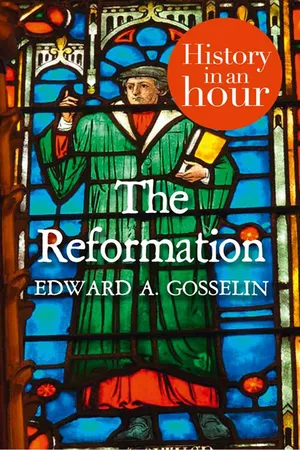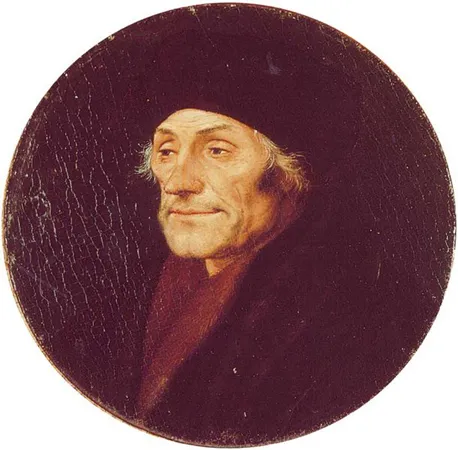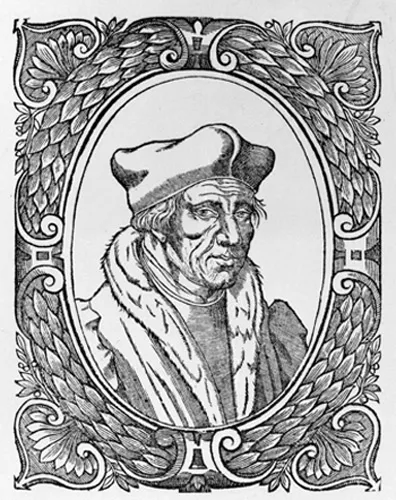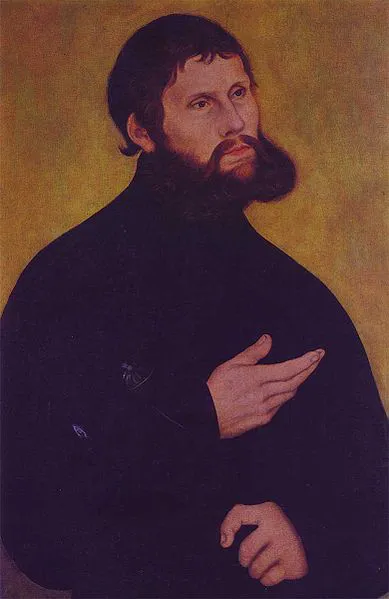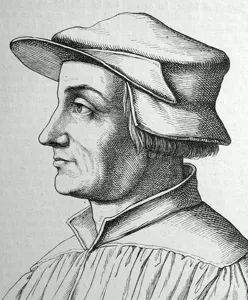Appendix 1: Key Players
Desiderius Erasmus (c. 1467–1536)
According to accounts attributed to Erasmus, he was born the illegitimate son of Gerhard (or Geert, last name unknown) and a woman named Margareta.
Desiderius Erasmus by Holbein the Younger
Erasmus’ early religious education in Holland was with the Brethren of the Common Life (a lay religious order) where he learned that to love God was more important than to know God, and this would guide his later thinking on religion. He enrolled in Paris among the poor students at the Collège de Montaigu. After graduating from Paris with a degree in theology, Erasmus travelled to England and met Thomas More and Dean John Colet, who both mentored him towards a path of serious religious study. Around 1506, Erasmus was sent from England to Bologna to supervise the tutoring of the sons of Henry VII’s physician. Here he learned classical Greek and classical Roman literature from humanist scholars in Florence. Within a few years, he was known as one of the greatest scholars of his age and could count among his friends popes, cardinals, kings and princes. He was well established in the meritocracy of the times, and enjoyed the status as one of the intellectual elite. It was rumoured that in Erasmus’ later years, Pope Paul III offered him the money necessary to become a cardinal of the Church, an offer he declined.
The Praise of Folly (1509, published 1511) is the work for which Erasmus is most widely known, in which he explores the term ‘folly’ as both a personification in its theatre form and as a mode of behaviour which includes, as examples, endeavours of humans in all stages of life, the role of the intellectual in society, and finally and, for him, most praiseworthy, Christian piety through what he terms the ‘foolishness of Christ on the Cross’.
In his Adages and other works, Erasmus endeavoured to eradicate abuses of the clergy and to return the Roman Catholic Church to the simpler, more Christ-like belief system of Apostolic times. Erasmus published an edition of the Greek New Testament in 1516 and, using the most ancient sources of the New Testament available, was critical of the Latin Vulgate Bible which by now had become error-ridden as a result of constant recopying throughout the Middle Ages and up to his own day.
In 1524, Erasmus wrote a treatise, A Discussion on the Freedom of the Will, which challenged Luther’s understanding of salvation by grace alone. In this work, he tried to persuade Luther to come back into the Catholic Church with the argument that baptism removes Original Sin and makes possible for there to be some minor human effort which God can then reward with the grace of salvation. Luther replied in 1525 in On the Enslaved Will that Erasmus’ arguments were ‘trivial, worthless and … so much dung’ because they were against the Word of God in Scripture.
Although Erasmus is considered to have had an important influence on some Reformation thinkers (especially Zwingli and some of the Radical reformers), his works and dialogues provided a major counterpoint to classical reformers such as Luther and Calvin.
Jacques Lefèvre d’Étaples (c. 1455–1536)
Lefèvre was born in Étaples, Picardie, in the north-western part of France. Educated at the University of Paris as a humanist scholar in the tradition of the ancient philosopher Aristotle (384–322 BC), Lefèvre’s first writings were about Aristotelian philosophical topics such as logic, metaphysics and ‘physics’, as well as a work On Magic and one on Euclid’s Elements. Though later referred to as a theologian, because of his commentaries on the Psalms, St Paul’s epistles and his French translations of the Bible, Lefèvre held no theological degree.
Engraving of Lefèvre d’Étaples
In 1508, Lefèvre was invited to the Abbey of St Germain-des-Près in Paris to reform errant monks. There, under the guidance of Abbot Guillaume Briçonnet, Lefèvre published the Quincuplex Psalterium (Fivefold Psalter) in 1509, which was based on the five versions of the Psalter in existence, as a way of correcting monastic life by giving them the ‘sweet’ words of the Psalms. Lefèvre was one of a group of scholars who produced French translations of the Bible in Meaux in the 1520s, at the invitation again of Briçonnet who was now bishop of that diocese.
Erasmus and Lefèvre met at the university in Paris and are said to have thought highly of each other. Martin Luther had met neither Erasmus nor Lefèvre, but he clearly preferred Lefèvre’s beliefs, and signifies this preference in a letter of 1 March 1517 to Johannus Lang, an Augustinian monk in Erfurt: ‘I fear that Erasmus does not exalt Christ enough and that he doesn’t develop the grace of God sufficiently, about which he is much more ignorant than Lefèvre d’Étaples. Erasmus exalts human values while Lefèvre exalts divine ones, as one can see in his Fivefold Psalter.’ Although this comparison does not make Lefèvre a Lutheran, it does show why many contemporaries considered him a Lutheran, and scholars even today see him as being more spiritual than Erasmus.
The arrival of Lutherans in France coincided with Lefèvre’s reform work in Meaux and this resulted in his being summoned to the law court (Parlement) of Paris in 1525 to answer charges of heresy. He fled to Strasbourg but returned in 1526 having been called back by Francis I. The king appointed him librarian of the royal collection and, later, tutor to the king’s children. Now under royal protection, Lefèvre was able to finish his French translation of the Bible, and published it in Antwerp in 1530. He enjoyed a peaceful retirement and died at Queen Marguerite’s court in Navarre.
Although he began his career as an Aristotelian scholar, we know about Lefèvre mainly through his publications, which include his commentaries on the Psalms and on the Pauline Letters which had served as much of the founding literature of Christianity.
He was well thought of by contemporaries and considered by some to be a great help to theologians with his study and restoring of scriptural and theological texts. His belief that piety was a ‘simple, affective wisdom’ was carried out in the reforms of Calvin and other classical Protestants, although he himself never went in for Reformation doctrines on grace, justification, predestination etc.
Martin Luther (1483–1546)
Martin Luther was born in Eisleben, in eastern Germany, to Hans and Margaretta Luther. Both parents were very strict with him, and Luther later told about how their whipping of him had drawn his blood as well as making him very fearful of his father.
Portrait of Martin Luther c.1522, by Lucas Cranach the Elder
When he received his Master of Arts degree, his father gave him the standard law book of the period, clearly expecting him to gain a law degree. However, Luther was caught in a fearsome storm and resolved to become a monk if he survived. He did and joined a monastic order. After becoming a monk four years later, Luther went on to become a priest the following year. As Luther raised the bread in the consecration of his first Mass, he suddenly felt that he, a mere man, could not look up to the majesty of God.
Luther continued to fear condemnation by God. He was encouraged by his monastic advisers to deepen his reading of biblical sources, especially the Psalms and the Letters of St Paul. He entered the University of Wittenberg as Professor of theology and between 1513 and 1517 Luther developed a theological body of thought, based above all on Paul’s Epistles to the Romans and Ephesians.
These ideas started the Protestant Reformation on 31 October 1517 when Luther nailed his Ninety-five Theses to the Wittenberg Castle Church door. Luther questioned the Church’s doctrine of salvation, and taught instead that man is saved by grace alone through God-given faith, and not at all by man’s good works. He eliminated five of the Church’s seven sacraments that had been thought in the Roman Catholic Church to be necessary for salvation, retaining only Baptism and the Eucharist as scripturally based sacraments. Luther did not believe that priests changed the bread and wine in the Mass into the actual body and blood of Jesus, but believed instead that the bread in the Lutheran Mass already had the body of Jesus in it.
Emperor Charles V declared Luther an enemy of the Empire at the Diet of Worms and Pope Leo X excommunicated him from the Roman Catholic Church, both in 1521.
Luther wrote many important works, especially On the Freedom of the Christian Man and Address to the German Nobility, and he translated the Bible into German, which allowed the Bible to be read by all literate Germans; a work important in the development of the modern German language.
Luther married Katharine von Bora, a former nun, and she bore him six children. He died in 1546.
Lutheranism spawned the Protestant Reformation, but it would not have ultimately concluded in a widespread reform without the movement itself splitting into separate religious groups. Each group further reformed Protestantism according to the developing theology of its own leadership. Persecution by Catholics as well as by other Protestants and the desire to convert large numbers to their cause resulted in a migration throughout Europe of congregants and their ideas. A major component in this development was the creation of the Reformed Church.
Huldreich Zwingli (1484–1531)
Zwingli was born in the eastern Swiss village of Wildhaus to a family of Alpine shepherds. Zwingli remained proud of his peasant origins throughout his life, and, from a young age, maintained an ardent patriotism and fondness for his fellow Swiss which only increased with his humanist education. In 1500, aged sixteen, Zwingli began his classical studies in Vienna where his circle of friends included other future reformers, some of whom would later become his opponents.
Engraving of Huldreich Zwingli
Zwingli returned to Switzerland in 1502 to the University of Basel where he continued his humanist studies. Here he also embarked on a serious study of the Bible under the tutelage of Thomas Wyttenbach of Biel. Wyttenbach impressed Zwingli with his criticisms of scholarly ‘trifling’, Church abuses and the papal doctrine of indulgences. Zwingli attributed to Wyttenbach his interest in becoming a village pastor in the town of Glarus, south-east of Zurich. He continued his humanist studies, and began to learn Greek so that he might better understand the New Testament and to study the Greek Fathers in addition to the Latin Church Fathers.
Zwingli also began to seriously study Erasmus whom he later met in Basel after Erasmus’ Greek New Testament had been published. But as ...
